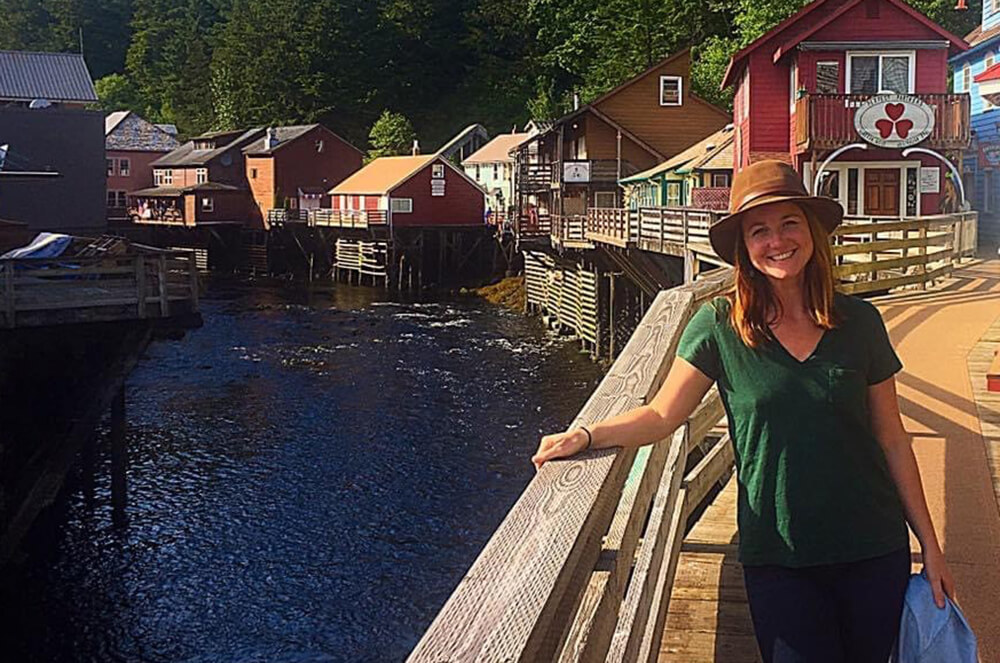Far and Away
Alaska-based PA Jodie Brewer Develops Care Plans for Patients in Remote Locations

Sick of school loans and longing to live somewhere unlike any other, Jodie Brewer moved to Alaska. Seven years later, her loans are history and her heart is filled with the satisfaction of knowing she softens the health blows suffered by her indigenous patients.
A 2012 graduate of Touro’s physician assistant (PA) program, Brewer, now 34, lives in Anchorage and specializes in both inpatient and outpatient orthopedics at the Alaska Native Medical Center, which serves natives throughout the state.
“One of the great things about Touro’s program is that professors made it clear that there’s no one way to be a PA,” she says. “It’s fine to work in a doctor’s office, but you’re not limited by anything other than your imagination and your skills to mold your own career.”
Her job is neither easy nor without frustration, but the work is challenging and rewarding. “What makes this job unique is the logistics that are involved in providing care for people from remote villages,” explains Brewer. “We have to develop care plans for people who have no access to running water, heat, food and regular healthcare. Third world conditions.”
This is rural healthcare at its hardest — winters that are 40 below zero, cases of frostbite are frequent and severe, transportation from hundreds of miles away can take days, not hours. “We’ve had patients with broken femurs who’ve arrived from the Arctic seven days later,” she says. “It’s not like what most of us think, that they get here quickly, are treated and are discharged to go to physical therapy three times a week for six months. They return to their remote villages.”
“These patients are resilient,” she says. “If the tough 80-year-old woman can return to her village and go back to picking berries like she’s done every summer, that is quality of life. If a man can still go hunting for caribou to feed his family through the winter, that is quality of life. If we can get them to functional capacity that is well enough to do what they’ve done their whole lives, that’s success.”
She sees up to 40 patients in the span of her 10-hour workdays. “I can see a range of orthopedic issues from knee arthritis and rotator cuff tears to more acute and serious issues, including open fractures, poly traumas from snow machine crashes to traumatic amputations,” she explains.
And those are the easy days. Traveling to remote field clinics often requires a plane, an ATV and occasionally, a seaplane. Brewer and her colleagues are put up in the clinic housing and during their three to four-day stays, they see some 80 to 100 patients. These patients are suffering from arthritis and are being evaluated for total joint replacement surgery, or they have follow-up appointments at the field clinic instead of traveling all the way to Anchorage. They also have knee, shoulder and back pain that need attention and injections. “Most of these clinics have an X-ray machine only,” Brewer explains, “so if they need further imaging, we coordinate travel to Anchorage.” These field clinics serve as the service center for smaller villages, so most of the patients are traveling by snowmachine, ATV or small plane to come to their appointments.
Now married with two little girls under two, Brewer loves winter sports, including ice fishing, fat biking up frozen rivers to glaciers, and extreme and back-country skiing. Alaska’s abundance of spectacular natural beauty proves a balm to her psyche. “You’re very isolated here and that’s isolated in Anchorage,” she says, laughing. She has come to understand the burdens of poverty and the lack of access to medical care that plague native Alaskans. Though her loans are long paid off in exchange for her years of work at the Alaska Native Medical Center, Brewer has bought a home and has no plans to return with her family to the lower 48. “I love the complexity of every facet of what we do,” she explains. “It can be frustrating at times, even depressing, there is no such thing as a typical day. It’s never, ever boring.”

